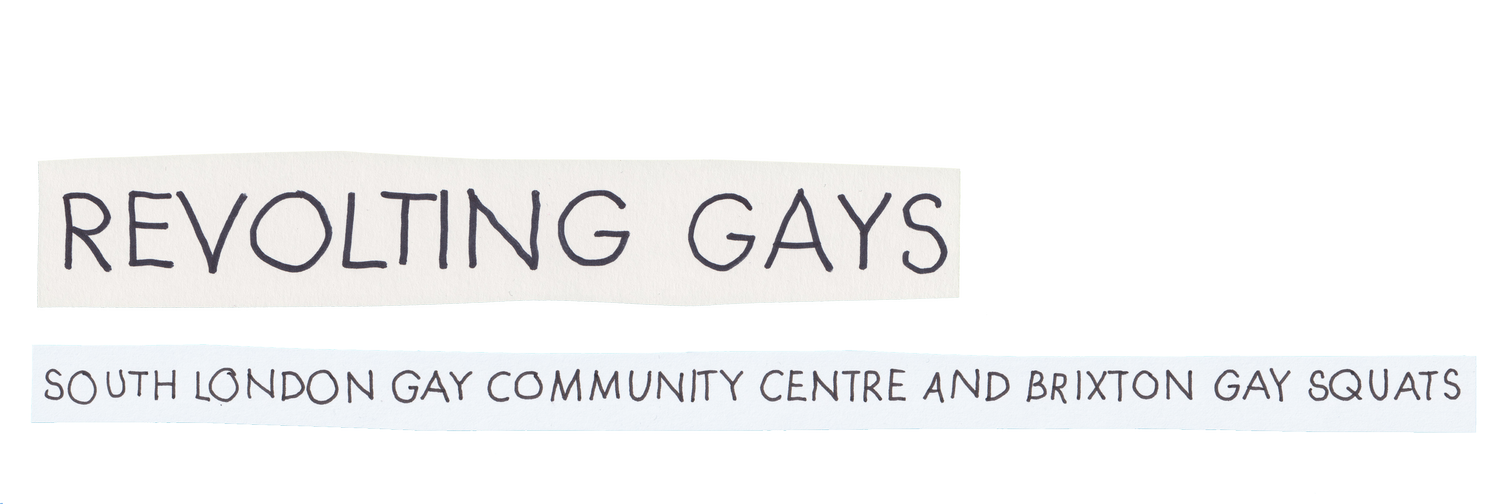Julian Hows’ Memories of The Gay Centre
Julian on our left next to Jamie Hall
Photo credit: Robert Workman archive, Bishopsgate Institute
Julian Hows was clear about the positive value the gay centre had in bringing people together at the 'lowest common denominator'. By that he meant there was no pack drill about who you were, where you came from and what status you possessed regarding 'social graces or class'. He found the centre far less cliquey and much more friendly despite the physical surroundings resembling 'bomb culture'. He regretted the fact that the friendliness he found went hand in hand with the ‘make-shift squalor’ of the place. Despite these physical limitations he felt that gay people were able to:
"....find a circle or a set or a peer group to which they felt they could belong. I think it provided that for an incredible number of people. It provided that for me definitely....It was very important as a melting pot....as a place where the batteries were created that started a lot of people off on a lot of other things."
He felt that a short-term, 'means to an end' approach by many gay centre users meant they lacked investment in and commitment to its continuation into the future. He believed that people used the place to build up a social network but did not engage any further in taking responsibility for running it. This became especially noticeable when the more experienced people who had squatted the gay centre and were the chief organisers disengaged after factional infighting over who should be allowed to use the centre. This left less able people with little organisational experience to run the place and it fell apart.
He saw violence against the gay centre as an unavoidable consequence of being an open access facility and opined that it would have been better to have developed more in the direction of a South London version of Friend with a structured and less open and chaotic set up. But despite the violence around the gay centre and squats he was determined to stay put:
"....one is living through violent times and either you exist within them and try to make your peace with them or you get out...Violence? I mean to say, why live in Brixton, you know....I think the possibility of violence is more frightening than the violence itself. But seeing that the gay centre had an open access policy it is something.....we all ended up living with or living under the threat of."
His chief recollections of memorable occasions at the gay centre, apart from getting drunk on scrumpy cider out of chipped mugs and talking to 'dossers' who wandered into the place, is the four hours spent in a cell at Brixton police station after a mad axe man got into the centre and wreaked havoc. He also recalled moving back in after the gay centre had been evicted:
"I can remember wriggling though a second storey upstairs window head first and ending up in the loo pan (laughter).....going downstairs and jemmying off doors and such like to get back in. I remember rebuilding the place."
Julian expressed clear opinions about the fate of the gay centre and the direction it would have gone in had it remained open. He dismissed the 'internal wrangling' that went on between users and organisers as the main reason for its demise. The continuing establishment of increasing numbers of gay squatted households on Railton and Mayall Roads led to an alternative community and meeting space to the centre. New arrivals simply by passed the centre altogether and headed straight to the squats. The drift of more and more people away from the centre meant a diminishing interest in running the place and left it in the hands of less experienced 'untogether' people who were 'not skilled enough to maintain the survival of that space' leading to its final closure. He was clear that had the centre survived:
"....it would be a community centre in exactly the same way as any neighbourhood community in any Inner London Borough has got a community centre...."
Though he felt that, unlike many underused community neighbourhood centres, the gay centre would be "very well utilised and together. Very nice."
His views on the gay community in the present (1984):

